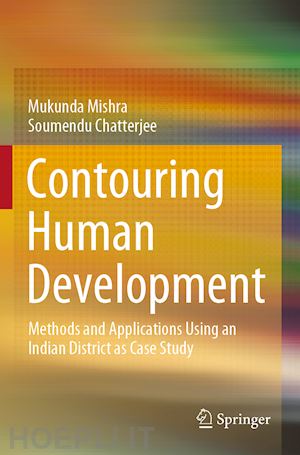
Questo prodotto usufruisce delle SPEDIZIONI GRATIS
selezionando l'opzione Corriere Veloce in fase di ordine.
Pagabile anche con Carta della cultura giovani e del merito, 18App Bonus Cultura e Carta del Docente
This book acquaints readers with a range of techniques to help them effectively identify, record, map, analyze and report on patterns in various dimensions of human development (HD) with spatial scales down to the village level. It is impossible to capture HD at the local and global scale with only a single index, because differences in HD at the international scale are caused by ‘general’ factors, whereas local-scale differences are influenced by ‘specific’ factors. This book offers a variety of methods for scientifically mapping HD at any spatial scale. It covers how to rationally select variables; how to test the models; how to validate the results, and how to analyze them. For this purpose, it employs a case study on an Indian district.
The socio-economic factors regulating the patterns of HD are now more complex than they were only a few decades ago, making it essential to incorporate newer models in order to successfully ‘replicate’ the real-world situation. Accordingly, the book offers essential methodological tools & techniques for mapping HD. It sheds new light on a handful of statistical multivariate analysis and machine learning algorithms that are rarely used in the social sciences when dealing with HD, yet have sound mathematical and statistical bases. These techniques can be successfully used for predictive analysis in the earth & natural sciences, decision sciences and management disciplines, and are equally effective in terms of capturing, predicting and projecting the composite HD ‘landscape.’
This book will especially benefit two groups of readers: firstly, HD practitioners who want to find out ‘why some areas are doing better than others’ by exploring the complex interactions of spatially linked variables with different HD parameters. And secondly, practitioners in other branches of the social sciences who are not concerned with HD but are looking for ‘hands-on training’ with techniques they can apply in their respectivefield of spatial investigations.
Mukunda Mishra is an Assistant Professor, Department of Geography, at Dr. Meghnad Saha College in West Bengal, India. The college is affiliated to the University of Gour Banga. Dr. Mishra completed his postgraduate studies in Geography and Environmental Management at Vidyasagar University (receiving top rank in both the B.Sc. and M.Sc. panels of merit) and holds a Ph.D. in Geography from the same University. He was selected for the prestigious National Merit Scholarship by the Ministry of Human Resource Development, Government of India. His research chiefly focuses on analyzing unequal human development, and on creating multi-criteria predictive models. He has more than ten years of hands-on experience in dealing with development issues at the ground level in various districts of eastern India.
Soumendu Chatterjee is a Professor and Head of the Department of Geography at Presidency University in Kolkata, India. He has been teaching Geographical Science at the undergraduate and graduate levels for more than twenty years. His primary research interest is in creating scientific models for predicting complex physical and human processes on the Earth’s surface. He has more than fifty publications in national and international journals of repute to his credit, and has headed several research projects funded by the University Grants Commission (of India), Department of Science & Technology (GoI), Indian Council of Social Science Research (ICSSR) and other respected agencies in India and abroad.











Il sito utilizza cookie ed altri strumenti di tracciamento che raccolgono informazioni dal dispositivo dell’utente. Oltre ai cookie tecnici ed analitici aggregati, strettamente necessari per il funzionamento di questo sito web, previo consenso dell’utente possono essere installati cookie di profilazione e marketing e cookie dei social media. Cliccando su “Accetto tutti i cookie” saranno attivate tutte le categorie di cookie. Per accettare solo deterninate categorie di cookie, cliccare invece su “Impostazioni cookie”. Chiudendo il banner o continuando a navigare saranno installati solo cookie tecnici. Per maggiori dettagli, consultare la Cookie Policy.